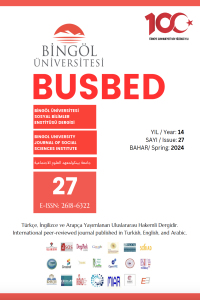HALİDİYE KÜTÜPHANESİNDE KAYITLI BİR KUR’AN FALI: TERCEME-İ TEFE’ÜLNÂME
A QUR’AN FORTUNE REGISTERED IN THE KHALIDI LIBRARY: TERCEME-I TEFEULNAME
Author(s): Emrah GÜNDÜZSubject(s): Cultural history, Social history, The Ottoman Empire, Contemporary Islamic Thought, Sociology of Religion, Qur’anic studies
Published by: Bingöl Üniversitesi Sosyal Bilimler Enstitüsü
Keywords: Fortune Telling; Qur’an; Bibliomancy; Tefeulname;
Summary/Abstract: Since before, fortune telling has been one of the efforts of human beings to find meaning in the face of the uncertainty of time and the world. In our culture, many types of fortune telling were used, and Qur’an fortunes were preferred in line with religious sensitivity, especially after Islam in the Ottoman Empire. This fortune telling, which is applied as the interpretation of the letters and verses of the Qur’an with the bibliomancy method, is also called Tefeulname. Tefeul (Bibliomancy), which is an Arabic word, means to interpret favourably. Many artefacts have been given in our history of this type of literature. One of them is the work called Terceme-i Tefeulname, which is covered in this article. The work written in Ottoman Turkish and determined in The Khalidi Library in Jerusalem is dated 1793-1794. It is noteworthy that the fortune-telling culture, which is not applied especially from an Islamic point of view and whose credibility is incorrect, is texted by including the Qur’an in the form of bibliomancy. On the other hand, the curiosity of Muslim societies and the enthusiasm to know the future have enabled different meanings to be given to bibliomancy and increased the interest in these fortune texts. Based on this, in this article, the meaning world of the Qur’an fortunes, which were texted in Ottoman society, was tried to be interpreted, and the translated written text of the aforementioned work was presented.
Journal: Bingöl Üniversitesi Sosyal Bilimler Enstitüsü Dergisi (BUSBED)
- Issue Year: 14/2024
- Issue No: 27
- Page Range: 47-75
- Page Count: 29
- Language: Turkish

